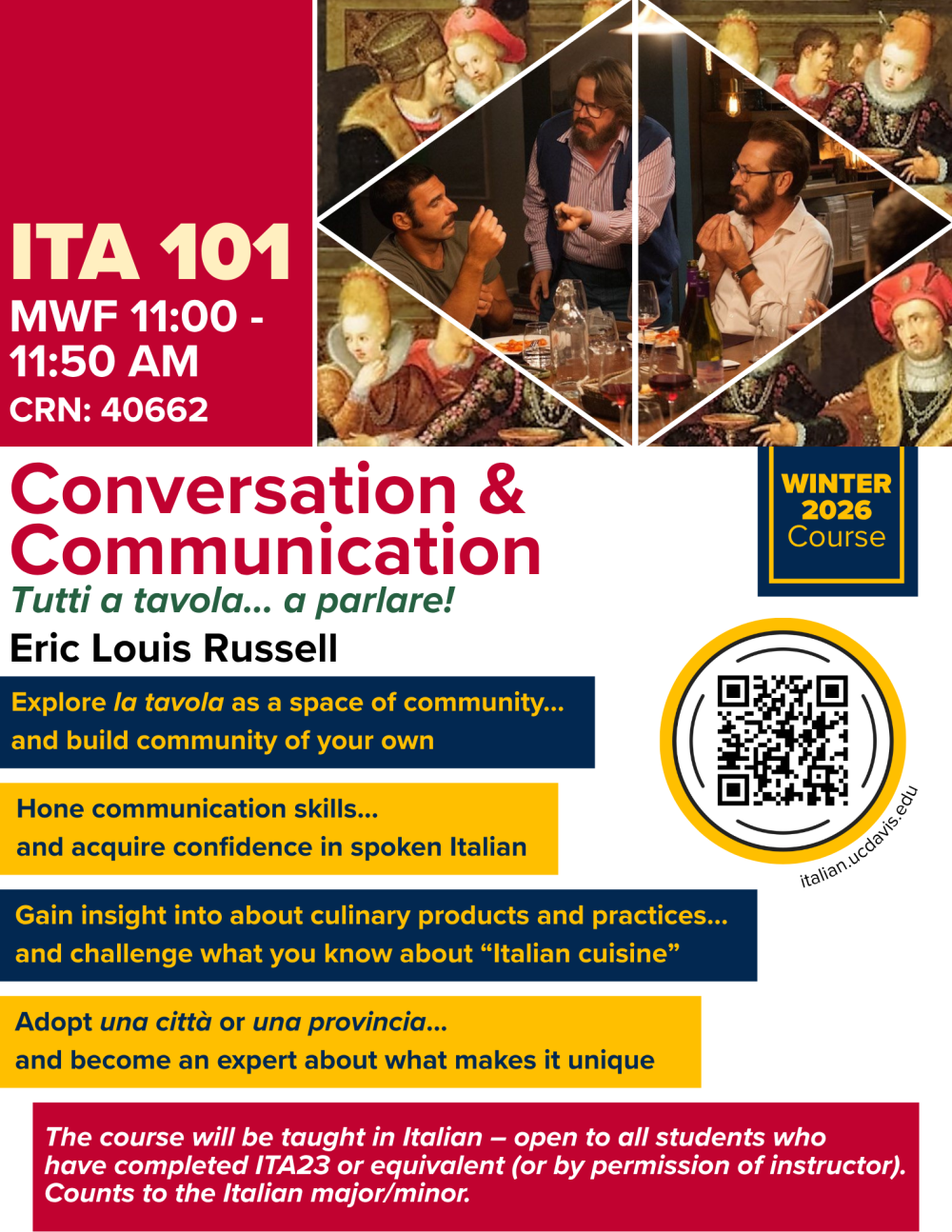Winter Quarter 2026
- For day, time, room, and TA information, see our PDF schedule or the class search tool https://registrar-apps.ucdavis.edu/courses/search/index.cfm.
- For all courses not described here, please refer to the General Catalog course descriptions: https://catalog.ucdavis.edu/courses-subject-code/ita/
Language Course Descriptions
- ITA 002: Elementary Italian
- ITA 002 is designed for beginners who have completed ITA 001 or its equivalent. This course provides students the opportunity to develop and expand their speaking and listening comprehension, as well as their reading/writing proficiency in Italian. Throughout the semester you will practice through the study of a wide range of communication patterns and real-life situations. By the end of Italian 002, you will be able to use Italian to talk about the present and the past, and well as your daily routines. You will be able to read and understand short texts, conversations, audio/video clips, and to write short dialogues/stories. In addition to our language courses, the Department offers an array of events and co-curricular activities such as weekly conversation/practice hours, films, cultural events, C.I.A.O. club activities, and free peer tutoring.
For instructor information, see https://registrar-apps.ucdavis.edu/courses/search/index.cfm
- ITA 022: Intermediate Italian
Melissa Demos - ITA 022 is for students who have completed ITA 021 or its equivalent (if in doubt, please take the placement exam). This second-year course will continue to provide students the review and refinement of the communication skills learned in your first four quarters of Italian. It will also introduce students to more advanced grammar. While the principal objective of the course is to further develop language abilities, students will gain further appreciation for Italian culture and be able to communicate both orally, and in writing, on a wide variety of topics. Students will improve their reading and comprehension skills through a series of short stories and other literary excerpts.
Undergraduate Course Descriptions & Flyers
- ITA 103 Communication & Conversation: “Tutti a tavola… a parlare!”
Eric Louis Russell In this class, we will hone our communication and conversation skills by exploring the cultural space of la tavola. This will consist of two interconnected elements: learning about products and practices; and explorations of how these are used and what they come to mean within a community. We will also compare this understanding among ourselves and reflect upon our own unique experiences, learning more about ourselves as cultural persons.
Each student will adopt a defined geographic area (a city or provincia) and, through their own learning about its culinary culture, become the instructor about this to the rest of the class. This is a chance for you to learn about a specific area in much more depth and practice your on-line communication by imparting this knowledge, all while pursuing inter-cultural inquiry through the adoption of new concepts and the application of new approaches.
Through the quarter, you will improve your verbal interaction skills, using contemporary Italian and appropriate registers by describing different cultural products and explaining the practices associated with them. This will be done through class-wide exercises and group activities, mini-lessons delivered in class, reflection writing and conversations, and a final project in video format (somewhat akin to a youtube episode or vlog, although this will not be uploaded online).
Evaluation for this class will consist of four elements:
- Participation in class activities: 30% of final grade
- Three mini-lessons (approx. 5 minutes each): 30%
- Two written reflections and follow-up conversations: 20%
- Final video project (approx. 10 minutes): 20%
Class participation will be noted each day based on the following and graded according to the attached rubric:
- Coming to class prepared, according to instructions
- Participating in class
- The use of Italian for all interactions
Three mini-lessons will be evenly spaced across the quarter. For each of these, specific instructions will be provided in advance (see Canvas). The goal of these is that you teach your classmates more about your chosen community’s culinary traditions: you will be expected to provide the class with pre-information activities (e.g. in the form of links, videos, handouts). For grading, see the “ITA101 work rubric.”
The two reflection exercises ask you to examine your own progress, focusing on oral/aural linguistic skills, and identify strengths and weaknesses. These will be followed on by one-on-one meetings during office hours or at a convenient scheduled moment. For grading, see the “ITA101 work rubric.”
The final assignment, in lieu of an exam, asks you to prepare and upload to the course website a 10-minute video in which you introduce, explain and exemplify one aspect of your community’s cultural traditions: this is to target an imaginary scholarly audience. Your focus might be a particular dish, an agricultural product or tradition, the history of winemaking in this area, ecological concerns and efforts tied to culinary products, or just about anything else related to the course focus and your chosen community. A series of preparation exercises in the second half of the quarter will frame this and allow interaction/feedback with the professor and the class as a whole.

- ITA 120A - Italian Literature of the 20th Century: The Novel - Pier Paolo Pasolini's Petrolio
Andre Naffis-Sahely This class will be entirely devoted to Pier Paolo Pasolini's novel Petrolio, which was left unfinished at the time of the author's murder. Its great subject is how fascism continued to influence Italy after the end of World War II. Carlo, its rebellious anti-hero, is determined to rise in the world of politics, and his journey through the corridors of power reveals the connections between the Fascist Party, the Mafia, the CIA, and the Communist Party, and how they shaped the Italy we know today. Taught in English
